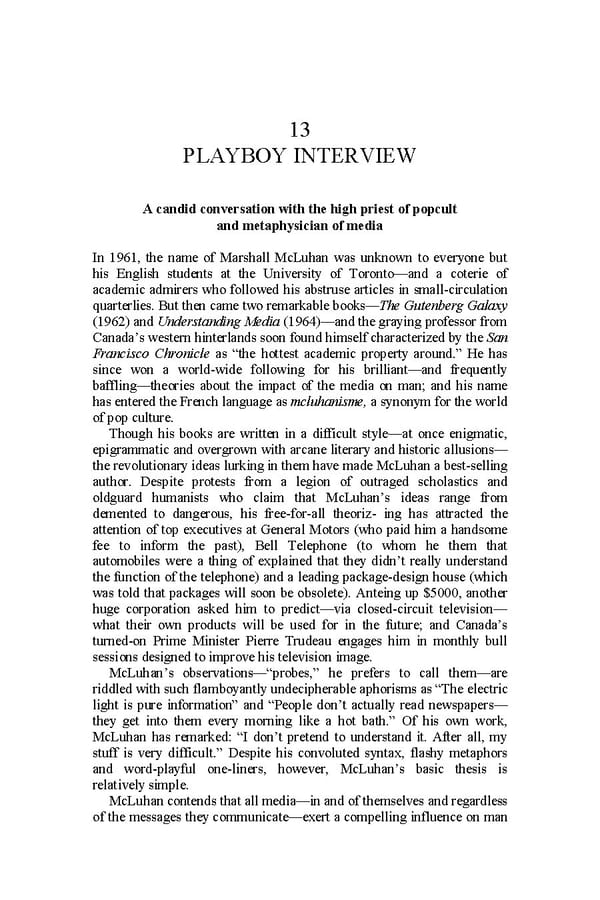13 PLAYBOY INTERVIEW A candid conversation with the high priest of popcult and metaphysician of media In 1961, the name of Marshall McLuhan was unknown to everyone but his English students at the University of Toronto—and a coterie of academic admirers who followed his abstruse articles in small-circulation quarterlies. But then came two remarkable books—The Gutenberg Galaxy (1962) and Understanding Media (1964)—and the graying professor from Canada’s western hinterlands soon found himself characterized by the San Francisco Chronicle as “the hottest academic property around.” He has since won a world-wide following for his brilliant—and frequently baffling—theories about the impact of the media on man; and his name has entered the French language as mcluhanisme, a synonym for the world of pop culture. Though his books are written in a difficult style—at once enigmatic, epigrammatic and overgrown with arcane literary and historic allusions— the revolutionary ideas lurking in them have made McLuhan a best-selling author. Despite protests from a legion of outraged scholastics and oldguard humanists who claim that McLuhan’s ideas range from demented to dangerous, his free-for-all theoriz- ing has attracted the attention of top executives at General Motors (who paid him a handsome fee to inform the past), Bell Telephone (to whom he them that automobiles were a thing of explained that they didn’t really understand the function of the telephone) and a leading package-design house (which was told that packages will soon be obsolete). Anteing up $5000, another huge corporation asked him to predict—via closed-circuit television— what their own products will be used for in the future; and Canada’s turned-on Prime Minister Pierre Trudeau engages him in monthly bull sessions designed to improve his television image. McLuhan’s observations—“probes,” he prefers to call them—are riddled with such flamboyantly undecipherable aphorisms as “The electric light is pure information” and “People don’t actually read newspapers— they get into them every morning like a hot bath.” Of his own work, McLuhan has remarked: “I don’t pretend to understand it. After all, my stuff is very difficult.” Despite his convoluted syntax, flashy metaphors and word-playful one-liners, however, McLuhan’s basic thesis is relatively simple. McLuhan contends that all media—in and of themselves and regardless of the messages they communicate—exert a compelling influence on man
 Essential McLuhan Page 228 Page 230
Essential McLuhan Page 228 Page 230